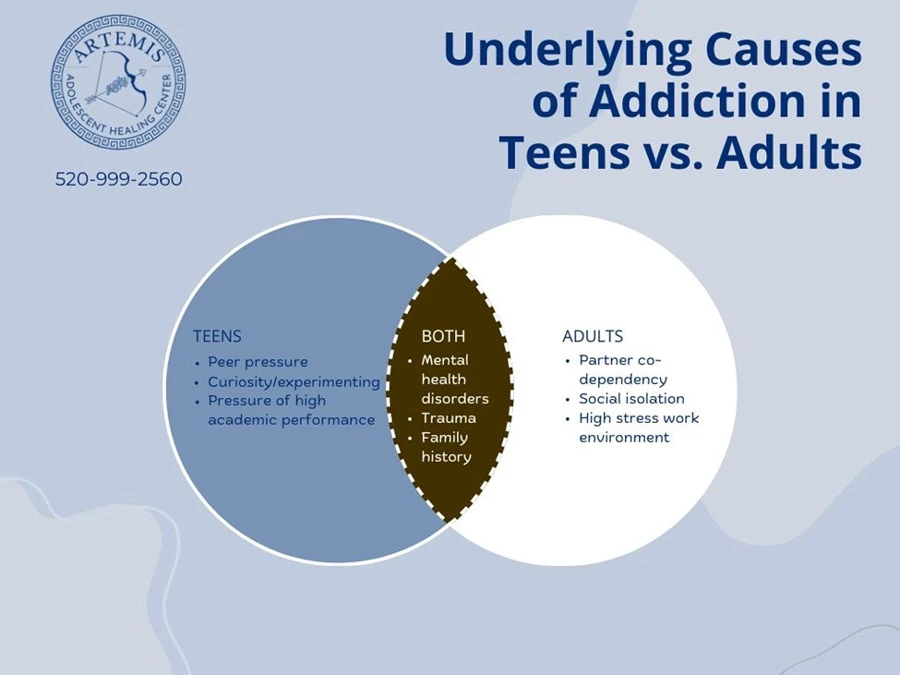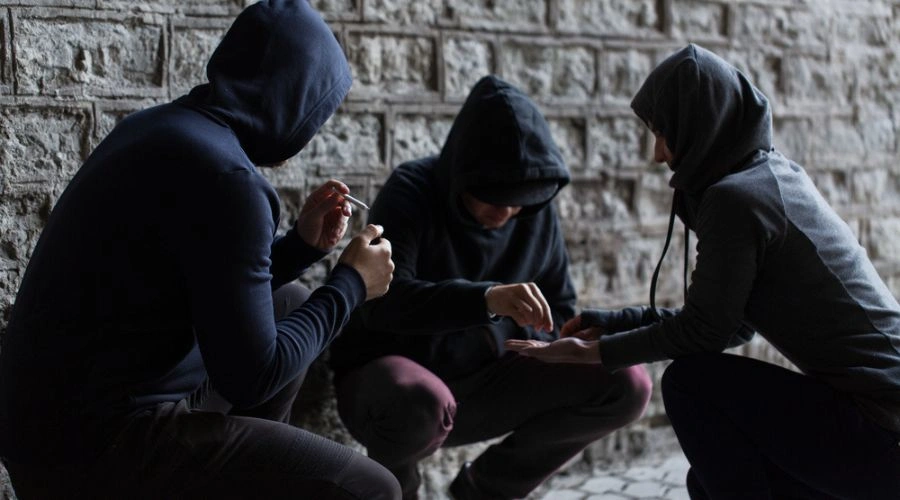Accredited Youth Mental Health and Addiction Treatment Programs
Not all mental health professionals have in-depth knowledge of teen recovery programs. Helping teens and their families or young adults in overcoming substance abuse or mental illness differs from working with adults. It requires a different approach and treatment process.
A great program encourages teens both to stop substance abuse and will support long-term academic success. We all understand that education is the key to a better future.
Catalina Behavioral Health recognizes the differences between teens and adults and understands that successful treatment requires a whole-family approach to treatment.
We’ve established the Artemis Adolescent Healing Center to address the mental healthcare needs of high-risk teens and their families. We have specialized knowledge in treating young people and can address their mental health issues.
Are you a parent or loved one looking for information on how you can help a struggling adolescent get back on track? Keep reading to learn how the Artemis treatment center can help with alcohol, drug addiction, and other psychological challenges in teens.
Get Accredited Treatment Programs at Catalina
Mental Health Professionals Understand Teen Brain Development
You might feel frustrated if you’ve tried to make your teen understand the dangers of drug abuse to no avail. Most families, school counseling staff, and well-intentioned relatives see teens they love engaging in drug use and try to approach it with adult reasoning.
However, the human brain does not reach maturity until around age 25. A fact sheet published by the National Institute of Mental Health (NIMH) explains that the prefrontal cortex is one of the last areas to mature fully. Why is that significant? It’s the part of the brain responsible for planning, prioritizing, and wise decision-making.
Even as adolescents make life-changing decisions – like taking the risk of drug use – their brains are not fully prepared for the consequences of their actions. Therapists with specialty training in the mental health disorders of adolescents develop therapy programs that keep this biological fact in mind.
Underlying Causes of Addiction in Adolescents and Young Adults

Another factor the teen drug rehab will consider is that the root causes of substance use disorders in teenagers/young adults and the fully mature brains of adulthood will differ. Teens have substance misuse triggers based on their particular life experiences.
Why Teens/Young Adults Start Using Alcohol or Drugs
Here are some of the common reasons teens try drugs at relatively young ages, according to the US Drug Enforcement Agency (DEA):
Peer Pressure and Alcohol/Drug Use
Adolescents and young adults feel tremendous peer pressure. They will often try drinking alcohol or taking drugs to fit in with the “cool crowd.” They’ve heard from teachers and parents about how substance use endangers their well-being, but the thought of being a social pariah outweighs the desire to be popular with their peers.
Example:
‘Rainy’ wanted to be more accepted by other kids at school. She was usually quiet and hoped to sink into the background to escape their notice. She was surprised when invited to a classmate’s birthday party. When she arrived, some of the more popular teens invited her to drink vodka, assuring her it was a good way to lighten up and prove she was worthy of the invitation.
When Rainy refused, they started treating her like a child and called her a baby. She eventually drank to stop the other youth from bullying her. This day instigated a cycle of weekend binge drinking to please Rainy’s new friends.
Curiosity About What It’s Like to Use Drugs

Teens explore the world by testing limits and pushing boundaries. They sometimes want to try new experiences just to see what they are like. Remember their brains aren’t developed enough to conduct a proper risk assessment. That means they can’t predict unwanted outcomes such as developing substance use disorders or overdoses.
Example:
‘Ramon’ came from a strict household where drugs and alcohol were forbidden. He wanted to know why these were such a big deal in his culture and tried heroin with a friend. He got such a tremendous feeling of being at ease that he couldn’t help but try it a few more times. Before long, Ramon was skipping class and struggling at his part-time job in the family bakery.
His parents were disappointed and soon discovered the drug abuse. After asking many questions about his drug addiction, they researched teen treatment programs to get the support Ramon and, indeed, the whole family, needed.
Get Effective Detox and Rehab Options at Catalina
Families Use Drugs or Drink
When family members have mental health issues, including substance abuse, youth in the family are likelier to follow that pattern. When a child watches adults around them indulging in regular, heavy substance use, they assume that this is standard, accepted behavior. The child emulates this family culture, often not realizing the actual risks.
Example:
‘David’s’ family had to cope with one severe blow after another. They’d faced apartment evictions, car repossessions, and other financial disasters. Despite all the setbacks, David’s father and stepmother always had money for tequila and weed.
David saw the behavior of reckless spending and marijuana and alcohol addiction as acceptable. He had anxiety about having food in the cabinets and a place to live. He was an adolescent with adult worries and saw no way out. He, too, started drinking – his dad even helped him get weed.
Mental Health Issues in Teens

Teens or young adults may have psychological symptoms that go unnoticed by parents or caregivers. Or, they may notice the symptoms but chalk everything up to moody teen behavior. These can indicate undiagnosed depression, anxiety, or trauma disorders. These adolescents may turn to drug use to ease the pain of these disorders.
Example:
‘Katey’ had heard of eating disorders but didn’t realize it was a problem that she saw herself as obese. She was very slim but wanted to thin down even more. She started to take meth to curb her appetite.
Her mother shared her concern about Katey’s diminishing body to the counseling department at her daughter’s school. Katey admitted using meth to the school counselor. Katey’s mother discovered teen therapy services at Artemis, where she took the first step to a healthier, substance-free life.
The Pressures of School Performance
Competition for academic scholarships can be fierce, with limited opportunities to rake in money to fund their college education. Teens and young adults sometimes turn to street amphetamines or trick their doctors into ADHD prescriptions to boost their academic performance. When taking these drugs, they have more focus and fuel for late-night study sessions.
Example:
‘Breonna’ was to be the first college-bound child in her family. She was bright, talented, and very driven to defy the odds. After losing her first chance at a scholarship, a friend shared her ADHD prescription with Breonna, assuring her it would give her better focus in less than a week. Breonna started buying the pills from a street dealer and continued to do so for months.
Her grandmother, who had raised her, was unaware of the addiction until Breonna got a pill laced with fentanyl. They found the addiction program at Artemis. Access to special therapists for teens allowed Breonna to get support for her needs.
Therapies to Expect at Teen Drug Rehab

What can clients expect to experience at teen and young adult treatment programs? All adolescents and young adults who come to our treatment center will get a customized program and work with top therapists. Here is a general overview of a few programs and services:
- Individual treatment for addiction
- Family therapy sessions
- Group therapy and peer groups
- Educational support
- Medically-supervised detox, managing withdrawal symptoms
- Life skills programs, such as learning to cope with triggers of addiction or manage anger
- Treating co-occurring disorders (depression, anxiety, trauma, or other mental health diagnoses)
- Aftercare planning to prevent relapses after leaving the treatment center
Young people or parents of teens who call for information about our addiction treatment center can feel confident that contact with us will be strictly confidential.
Up To 100% of Rehab Costs Covered By Insurance
What Will the Recovery Journey Look Like?
The first step will be calling our admissions representative to do an accurate assessment of the teen’s needs. The assessment process gives us a good idea of how we can help with your child’s needs.
Next, we lead you through the intake process, where you complete an application and tell us about the child’s other medical or psychological treatment services. It is critical that we know these details to help ensure a positive outcome.
We’ll next verify your insurance coverage, giving you peace of mind that you won’t have any uncovered services. You will know the costs before enrolling in youth programs.
Finally, your child will be admitted to our programs. They’ll receive daily therapy tailored to teens ages 13 and up. The treatment they receive will help them chart a new course – away from drugs or alcohol and toward a better future.
Artemis Delivers Mental Health Programs Designed for Teens
Does your teenage child struggle with drug or alcohol abuse? It’s not too late for therapy to make a positive impact and break the cycle of abuse. Call Artemis for therapy and drug addiction programs that meet the needs of teens.
We are here to help; call us today. All calls are confidential, so please reach out now for support.





